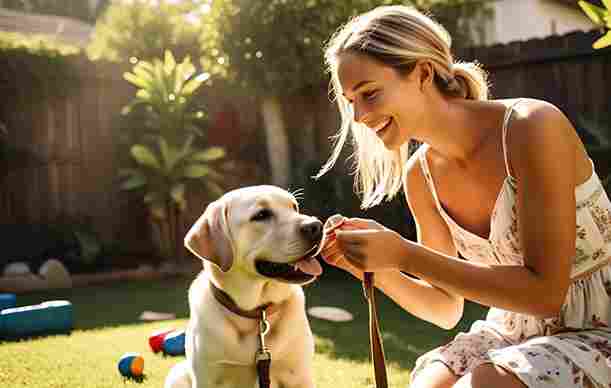A Warm Hello to All the Dog Parents! 🐶💛
First of all, if you’re reading this, you’re already a wonderful dog parent.
Training a dog is looking easy but it is difficult. It is like raising a toddler — messy, ridiculous, and full of moments that make you cry and laugh at the same time. (Usually while wiping paw prints off your clean jeans.)
Only teaching your dog to sit and stay isn’t just about good manners. It’s about building trust, keeping them safe, and giving you bragging rights at the dog park. (“Oh, Rufus? He sits like a champ.”)
Now be ready to jump in to make training easy, fun, and maybe even a little bit silly.
Here we go!
How to train your dog?

1. Start with the Right Treats 🍗
Dogs aren’t so different from us — they’ll work for snacks!
Use tiny, tasty treats that your pup goes bonkers for. Think little pieces of chicken, cheese, or store-bought training treats.
The smaller, the better. We want them begging for more without getting full in two minutes.
👉 Example: My dog Daisy will climb a mountain for a slice of boiled chicken. For kibble? She might think about it… and then walk away.
2. Choose a Quiet Spot 🏡
Distractions are a puppy’s worst enemy (next to the evil vacuum cleaner).
Pick a quiet, familiar spot like your living room, backyard, or even the hallway.
Later, once your dog is a pro, you can test them in louder, more exciting places like the park.
🛎 Expert Tip:
“Environment matters in early training. Quiet places build faster focus.” [PetMD, March 2023]
3. Keep Sessions Short ⏰
Dogs have the attention span of a goldfish when they’re excited.
Don’t forget to practice for 5–10 minutes at a time. That’s it! End on a happy note — even if your dog almost got it right.
👉 Example: When I first taught Daisy to sit, our “lessons” were shorter than a TikTok dance. And guess what? She learned faster!
4. Teach “Sit” First 🪑
Here’s a simple method:
Hold a treat close to your dog’s nose.
Slowly move it upward — their head will follow, and their butt will naturally lower.
As soon as their butt hits the ground, say “Sit!” and give them the treat.
🎉 Praise them like they just solved world peace!
5. Add Hand Signals ✋
Dogs are body language experts.
Use a hand signal (like an open palm facing up) while you say “Sit” or “Stay.”
Later on, you can even silent-command your dog like a wizard at the park.
🛎 Expert Tip:
“Hand signals strengthen communication with dogs and make training twice as fast.” [American Kennel Club, January 2024]
6. Practice “Stay” with the 3 D’s 🛑
The three D’s are: Distance, Duration, and Distractions.
Distance: Start by standing right in front of them. Step back slowly as they get better.
Duration: Start with 2 seconds. Then 5. Then 10. Baby steps!
Distractions: Only add noise or toys after they master the basics.
👉 Example: I started by asking Daisy to “stay” while I danced awkwardly in front of her. She thought I’d lost my mind… but she stayed put!

7. Reward Calm Behavior 🧘♀️
If your dog stays sitting, don’t wait too long — praise them while they’re still calm.
Otherwise, they’ll think they’re getting rewarded for jumping up like a kangaroo.
🐕🦺 Quick Tip: Softly toss the treat to them so they don’t have to break their “stay” to come to you.
8. Use a Release Word 🆓
Teach your dog when it’s okay to move.
Use a cheerful release word like “Okay!” or “Free!” right before you let them get up.
👉 Example: I say “All done!” in a super chipper voice, and Daisy zooms off like she’s just been freed from jail.
9. Stay Patient (and Laugh a Lot) 😂

Some days, you will notice your dog acting like they’ve never heard of sitting before. That’s normal!
Dogs have off days too, just like we do.
Don’t give up here, stay patient. Take a break, use your sense of humor. If either of you is getting frustrated.
🌟 Fun Fact:
Even professional trainers have dogs that flop dramatically during lessons sometimes.
10. Make It a Daily Habit 📅
Training isn’t a one-and-done process. Exercise a little every day—while walking, before meals, or even during TV commercials.
👉 Example: Every time I called Daisy for dinner, I made her sit and stay first. Now, she automatically plops her butt down before I even ask.
🎁 Bonus Tip: Train Before Meals 🍽
Here’s a sneaky genius move:
Ask your dog to sit and stay before you set down their food bowl.
Food is the ultimate reward, so they’ll learn extra fast. Plus, it teaches them that good manners = tasty dinners!
Final Woof 🐾
Teaching your dog to sit and stay is one of the best gifts you can give them (and yourself).
It keeps them safe, builds your bond, and, let’s be honest — it’s adorable.
Be patient, be silly, and celebrate every tiny success. Your dog will love you for it, and you’ll be the proudest dog parent at the park. 🐕
Top Questions Dog Owners Ask
1. How long does it take to teach a dog to sit and stay?
It depends on your dog’s age, breed, and personality. Some dogs pick it up in just a few days, while others might take a few weeks. Consistent short sessions (5–10 minutes a day) usually bring the best results. Be patient — every pup learns at their own pace!
2. What if my dog won’t stay sitting?
Don’t worry! It’s common at first. Go back to basics: reward smaller successes, shorten the stay time, and reduce distractions. Slowly build it up again. Remember, staying calm yourself helps a lot too!
3. Should I use treats every time?
At the beginning, yes! Treats are a great way to motivate your dog. As your dog gets better, you can slowly switch to praise, petting, or occasional treats to keep them excited without depending on snacks every time.
4. Can I teach an older dog to sit and stay?
Absolutely! Older dogs can learn new tricks — they might even focus better than puppies. Just be a little extra patient, especially if they’re set in their ways. Training can also be great mental exercise for older dogs.

Karim Kaifi is an experienced pet owner and writer. He shares practical, research-backed advice based on over 10 years of caring for cats and dogs.






